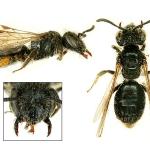This very small bee is a close relative of Andrena minutula (Kirby) and can be easily misidentified as such by the novice. The species is bivoltine. Perkins (1914) formerly treated the individuals of these broods as distinct species: Andrena parvuloides (spring) and Andrena minutuloides (summer). Later he relegated the name parvuloides to that of a junior synonym of minutuloides (Perkins, 1919).
The species is confined to southern England. Possibly not present in the Channel Islands; Richards (1979) only cites a doubtful record from Guernsey. This is generally regarded as a rare and very local bee but, occasionally, can be numerous where found. The summer brood is usually much more numerous than the spring one.
In the Palaearctic the range includes southern Fennoscandia south to Iberia, Morocco, Italy, Greece and Turkey (Gusenleitner & Schwarz, 2002); also known from Daghestan.
Falk (1991) lists the species as Nationally Notable/Na (now known as Nationally Scarce).
The species is usually associated with well-drained soils such as sandy heaths and commons and especially calcareous grasslands.
Generally considered to be bivoltine, with both a spring generation (mid April to June) and a summer one (mid July to early September). However, most records of this species are confined to the summer months (post June). Specimens of the spring brood are very rarely encountered both in the field and in collections. For example, the profile author regularly recorded over several years large numbers of the summer brood near Winchester, Hampshire, but despite searches he never found specimens of the bee in the spring months.
Nests are rarely found and there is apparently no such record from Britain. In mainland Europe Kocourek (1966) and Dylewska (1987) describe the species as nesting solitarily.
Spring brood: cabbage, speedwell and daisy. Summer brood: hogweed and yarrow. In Britain the species is strongly associated with Apiaceae, such as wild parsnip, hogweed and wild carrot.
Nests are possibly subjected to attacks by the cleptoparasitic Nomada flavoguttata (Kirby). This association is known in Germany (Westrich, 1989) and may occur in Britain too.
2016


